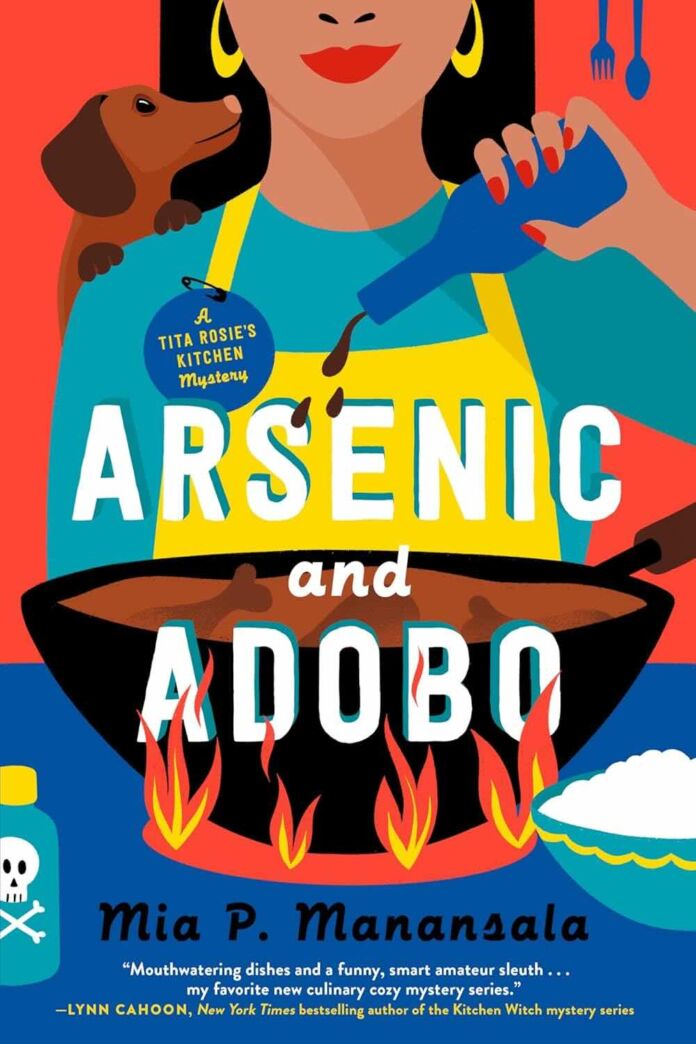In her debut novel “Arsenic and Adobo,” Mia P. Manansala crafts a compelling cozy mystery that perfectly balances the warmth of Filipino culture with the chilling elements of murder. As the first installment in the Tita Rosie’s Kitchen Mystery series, this book introduces readers to Lila Macapagal, a character whose journey from heartbreak to amateur sleuth is as rich and complex as the Filipino dishes that fill its pages.
Setting and Cultural Context
The story unfolds in the fictional small town of Shady Palms, Illinois, where Manansala masterfully creates a microcosm of Filipino-American life. The author’s intimate knowledge of both cultures shines through in her detailed descriptions of family dynamics, food preparations, and the unique challenges faced by second-generation immigrants. The setting feels authentic and lived-in, making readers feel like they’re eavesdropping on real family conversations over steaming plates of adobo.
Character Development
Lila Macapagal emerges as a thoroughly modern protagonist who struggles with cultural expectations while maintaining her individuality. Her relationship with her Tita Rosie (aunt) and grandmother provides emotional depth to the story, while the “Calendar Crew”—her three godmothers named April, Mae, and June—adds both humor and complexity to the family dynamics.
The supporting cast is equally well-drawn:
- Adeena Awan, Lila’s best friend and barista extraordinaire
- The various restaurant owners who form a community within the story
- Detective Park, whose initial antagonism develops into something more nuanced
Plot and Pacing
The mystery begins when Derek Winter, Lila’s food critic ex-boyfriend, dies in her aunt’s restaurant. What follows is a carefully constructed investigation that weaves together multiple threads:
- A failing family restaurant
- Mysterious drug connections
- Complex relationships from the past
- Small-town politics and prejudices
While the pacing occasionally slows during detailed food descriptions, these moments serve to enhance the cultural authenticity rather than detract from the story’s momentum.
Writing Style
Manansala’s writing style is fresh and engaging, peppered with humor and cultural references that feel natural rather than forced. Her descriptions of food are particularly noteworthy—detailed enough to make readers hungry but not so technical as to lose their interest.
Areas for Improvement
While the novel succeeds on many levels, there are a few areas where it could be stronger:
- Some plot resolutions feel slightly rushed in the final chapters
- Certain character motivations could be more fully developed
- The romantic subplots occasionally compete for attention with the main mystery
Series Development
“Arsenic and Adobo” sets up an engaging universe that continues to expand through subsequent books:
- “Homicide and Halo-Halo” (Book 2)
- “Blackmail and Bibingka” (Book 3)
- “Murder and Mamon” (Book 4)
- “Guilt and Ginataan” (Book 5)
Each title cleverly pairs a crime with a Filipino dessert, creating a unique brand within the cozy mystery genre.
Cultural Representation
One of the novel’s greatest strengths is its authentic representation of Filipino-American culture. Manansala skillfully weaves in:
- Traditional Filipino values and customs
- The complexity of intergenerational relationships
- The role of food in maintaining cultural identity
- The challenges of balancing traditional expectations with modern American life
Food Writing
The culinary aspects of the novel deserve special mention. Manansala’s descriptions of Filipino cuisine are:
- Detailed without being pretentious
- Educational without being didactic
- Sensory-rich and evocative
- Enhanced by included recipes at the book’s end
Impact and Innovation
Within the cozy mystery genre, “Arsenic and Adobo” stands out for several reasons:
- Its fresh perspective on Asian-American experiences
- The seamless integration of cultural elements
- Strong female relationships that avoid common stereotypes
- A mystery plot that goes beyond typical cozy conventions
Comparable Works
Fans of multicultural mysteries might also enjoy:
- Vivien Chien’s Noodle Shop Mystery series
- Ovidia Yu’s Aunty Lee mysteries
- Jesse Q. Sutanto’s Aunties series
Final Verdict
“Arsenic and Adobo” is an interesting read for its engaging blend of culture, cuisine, and crime. While there’s room for growth in certain areas, Manansala’s debut shows tremendous promise and establishes a strong foundation for the series.
The novel successfully:
- Introduces compelling characters with room for development
- Creates a rich, culturally authentic setting
- Delivers a satisfying mystery with multiple layers
- Provides a fresh perspective in the cozy mystery genre
Recommendation
This book is highly recommended for readers who:
- Enjoy culinary mysteries with authentic cultural elements
- Appreciate strong family dynamics in their fiction
- Are interested in Filipino-American experiences
- Like their mysteries with a side of humor and heart
The included recipes and glossary of Filipino terms add extra value, making this not just a mystery novel but also a window into Filipino-American culture.
Looking Forward
With four more books in the series, readers can look forward to further adventures with Lila and the colorful cast of Shady Palms residents. Each subsequent book promises to delve deeper into both the mysteries and the rich cultural tapestry that Manansala has begun weaving in this impressive debut.
“Arsenic and Adobo” marks the beginning of what promises to be a delightful series that satisfies both as a mystery and as a celebration of Filipino-American culture. Despite some minor first-novel missteps, it successfully establishes Manansala as a fresh voice in the cozy mystery genre.





